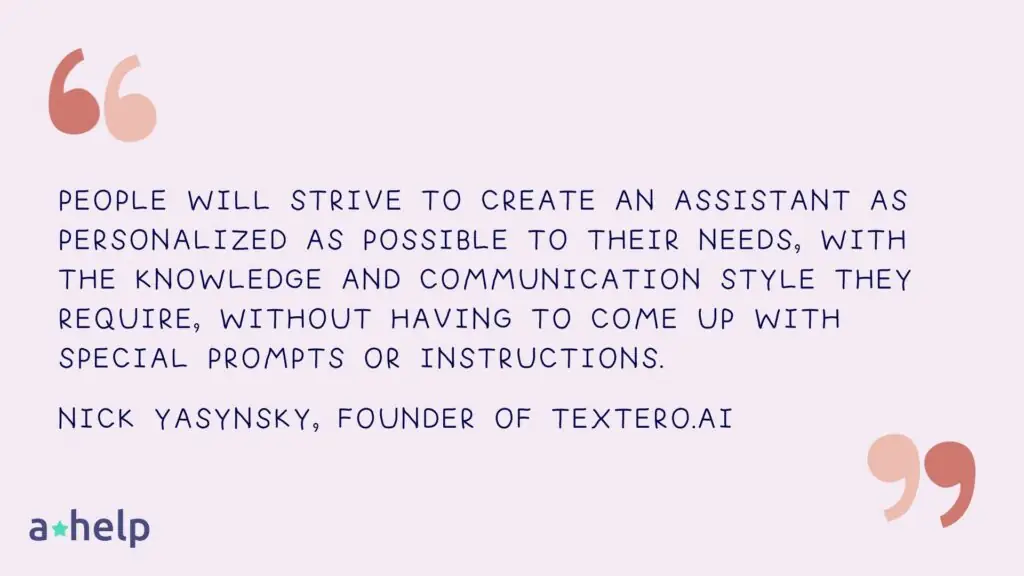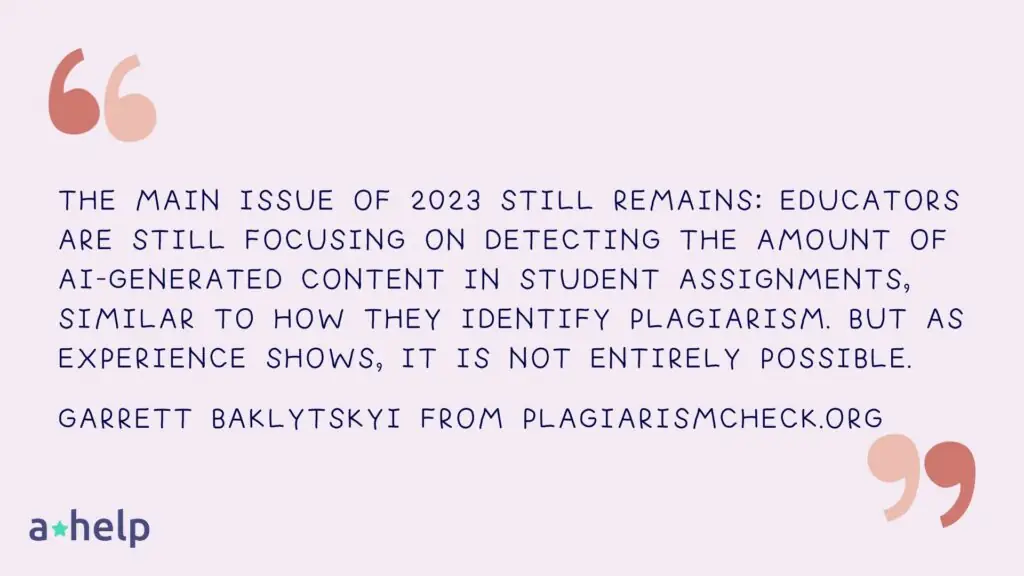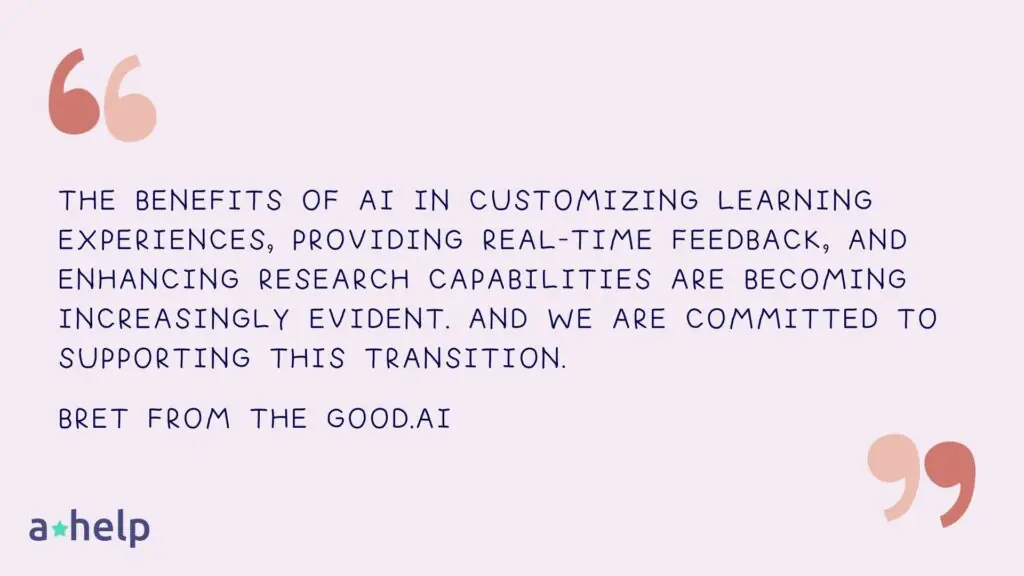Are you ready to wrap up the year and set New Year resolutions? Yes, the fresh start is right around the corner and the AcademicHelp team is ready to take a look back at the changes that have made history in 2023 and reshaped the education field.

✅ AI Essay Writer ✅ AI Detector ✅ Plagchecker ✅ Paraphraser
✅ Summarizer ✅ Citation Generator
Personalized texts with AI Writers
AI got integrated into all spheres of our lives but it feels like the world of academics took the biggest brunt and underwent a significant transformation. AI writers started to spring up as a solution to fight writer’s block and get everything fast before the endless burning deadlines.
The AcademicHelp witnessed the swift development from the start of 2023. If at first, the biggest talk on the block was ChatGPT, around midyear our team had over 45 AI essay generators to share with our readers. Not to mention that big names hopped on the latest trend and introduced advanced writing features, presenting tools like Grammarly Go, Quillbot Flow, and Notion.AI.
Throughout the whole year, modern tools have made significant strides, enhancing the writing process in education. Now, learners can do more than just draft an essay. The advanced power of AI under the right use can help students to get better at writing, polish their style, and make each text error-free. Meaning, that AI-powered platforms are ready to deliver to personalized needs.
“Personalization is and will be a big part of AI development. People will strive to create an assistant as personalized as possible to their needs, with the knowledge and communication style they require, without having to come up with special prompts or instructions.”
Nick Yasynsky, founder of Textero.ai
The importance of authentic writing was brought up by the AI sensation itself – ChatGPT. The updated GPT4 version piqued the interest of users by introducing more enhanced writing capabilities, and most importantly, being less robotic. The AcademicHelp team challenged GPT 3.5 & GPT 4 to a duel to see which version would take the crown. The verdict: GPT-4 edges out GPT-3.5, though slightly, for essay writing because it produces more interesting and logical texts.

Making writing authentic is the direction AI essay writers are going indeed. While some students do require assistance and advice along the way, learners also need to learn to embrace their ideas and thoughts. Refreshed and updated versions of advanced tools are ready to ace the mark in 2024.
“In 2023, The Good AI significantly improved its AI essay writer by enhancing performance and introducing customizable features for tone, type, and academic level, and added a tool for users to refine parts of their essays by highlighting text. Also, we increased the maximum word count for broader idea expression.”
Bret from The Good.ai
AI writers like Textero.ai and The Good.ai are doing their best by listening to students’ requirements and reacting with quick cures to their academic pains. However, the writing process is not the only issue that learners face. Under a pressing deadline, processing huge volumes of information, while producing an essay, followed by a report and then an article review, is only within the capabilities of a computer, not a human being – unless you have a Time-Turner. Hence, AI writing services are becoming essential tools for modern education.
“At Textero, we wanted to create a product that would help students write their research, find new information, and do it effectively. That’s why we released a new version of Textero that embodies these principles in life.”
Nick Yasynsky, founder of Textero.ai
All in all, AI has reshaped academic writing, offering customized assistance to students, thus becoming a vital component of modern education. Additionally, this year, we witnessed the release of new language models, such as Gemini, Claude 2, and Llama, which expand the capabilities of AI writers.
AI Detection and Plagiarism Checking: Navigating New Challenges
While AI writers take the burden off never-ending tasks and creative slowdown there is another burning problem that comes along with innovative technology – integrity protection.

Educators and students face the challenge of ensuring that work is original and not AI-generated. Teachers seek tools that can show how much of a student’s work is AI-written, just like they can see the level of plagiarism. However, detecting AI-written text, especially if it’s been changed to sound more human, is extremely hard.
On that account, at the beginning of the year, certain schools and universities refused to check students’ works on the presence of AI-generated content because nothing was settled. The big names in integrity protection, such as Turnitin and Copyleaks stepped into the field of AI detection. The new AI plagiarism checkers were quick to arrive as well.
“The main issue of 2023 still remains: educators are still focusing on detecting the amount of AI-generated content in student assignments, similar to how they identify plagiarism. But as experience shows, it is not entirely possible. Simply put, spotting AI-edited text, akin to finding a needle in a haystack.”
Garrett Baklytskyi from PlagiarismCheck.org
Stating the obvious, the need to detect AI-generated content in papers will be relevant in the upcoming year. Learning from experience, it is nearly impossible which leads to inaccurate flagging and long debates in the school’s academic integrity committee meetings, where students and faculty gather to discuss issues related to AI use in academic work. In light of these challenges, OpenAI has shut down its AI text-detection tool due to concerns over its low accuracy rate.
It seems that the PlagiarismCheck.org team can answer all the ‘how?’, ‘what?’, & ‘why?’ questions on the matter of maintaining integrity.
“The burning questions demand rapid answers. However, in the field that we are in, it does not happen in the blink of an eye. As for our tool, we have significantly improved our model thanks to a new approach, and in January there will be a release not only for English but also for Spanish! We released a new product, Integrito Activity reports, which analyzes the history of a Google Doc and shows editing time, the number of sessions, and compares sessions with each other. For students, this is an opportunity to prove that they worked on the assignment, even if the AI detector indicated that it was AI-generated. For teachers, it’s a chance to check whether the student worked on the assignment.”
The PlagiarismCheck.org team
As AI use in writing increases, teachers and students are facing the tough task of figuring out if work is original or created by AI. This has led to a growing need for advanced detection tools that can analyze document histories and provide insights into the writing process, aiding in the validation of student efforts and academic integrity.
Future of AI in Education
2023 marked a pivotal year in the integration of AI into academic writing and plagiarism detection. Looking forward to 2024, AI is expected to deepen its role in the academic field.
“In order to enrich the research and writing process, The Good.ai team will be working on a feature that allows users to incorporate images and URLs as references in the essays. In terms of AI’s role in the classroom, we anticipate a growing embrace by educators. The benefits of AI in customizing learning experiences, providing real-time feedback, and enhancing research capabilities are becoming increasingly evident. And we are committed to supporting this transition.”
Bret from The Good.ai
Plagiarism detection is undergoing significant transformation as well. As AI technology advances, the challenge of accurately recognizing AI-generated content becomes more complex.
“In 2024, we at PlagiarismChecker.com will continue to develop Integrito to determine text originality at an unprecedented level and to detect even the most advanced attempts of fraud (both AI and plagiarism), which are currently not detected even by the most popular plagiarism checkers.”
Garrett Baklytskyi from PlagiarismCheck.org
“Regarding the academic sphere, as I see the situation, it will not be so important who wrote the paper, but rather its quality. If the research is unique, high-quality, and brings something new — the rest is history. Users will rely on AI writing services that bring the element of trust. Textero is actively working on it.”
Nick Yasynsky, founder of Textero.ai

Overall, 2023 was a game-changer in education with AI revolutionizing writing and plagiarism detection. As we move into the new year, the focus sharpens on advanced tools to ensure integrity, signaling an even deeper integration of AI in education.
Follow us on Reddit for more insights and updates.





Comments (0)
Welcome to A*Help comments!
We’re all about debate and discussion at A*Help.
We value the diverse opinions of users, so you may find points of view that you don’t agree with. And that’s cool. However, there are certain things we’re not OK with: attempts to manipulate our data in any way, for example, or the posting of discriminative, offensive, hateful, or disparaging material.